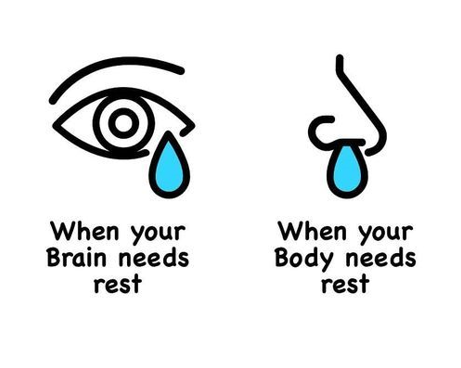Recognizing When Your Brain and Body Need Rest
In our fast-paced, always-on world, it's easy to forget the importance of rest and the signs our body and mind give us when we need to slow down. The simple yet profound illustration you provided captures a universal truth: when our brain or body needs rest, they send us clear signals. Understanding these signals and responding appropriately can significantly improve our well-being and productivity. Let's delve deeper into the importance of recognizing these signs and the steps we can take to address them.
When Your Brain Needs Rest
The Symptoms:
- Mental Fatigue: Difficulty concentrating, forgetfulness, and a lack of clarity are common indicators.
- Emotional Instability: Feeling overwhelmed, easily irritated, or unusually emotional can signal mental exhaustion.
- Physical Manifestations: Headaches, tension, and even dizziness might accompany mental fatigue.
Why It Happens: Our brains are constantly processing information, solving problems, and managing our emotions. Without adequate rest, our cognitive functions begin to decline, leading to mental fatigue.
How to Rest Your Brain:
- Take Breaks: Regular breaks during work can prevent burnout. Try the Pomodoro Technique—25 minutes of focused work followed by a 5-minute break.
- Practice Mindfulness: Meditation and mindfulness exercises can help clear your mind and reduce stress.
- Engage in Leisure Activities: Hobbies and activities you enjoy can provide a mental break from daily stresses.
- Get Quality Sleep: Ensure you're getting enough restorative sleep. Create a bedtime routine to improve sleep quality.
When Your Body Needs Rest
The Symptoms:
- Physical Fatigue: Persistent tiredness, muscle soreness, and a lack of energy are common signs.
- Reduced Performance: Decreased strength, endurance, and motivation to exercise.
- Health Issues: Frequent colds, slow recovery from injuries, and other health problems can indicate that your body needs rest.
Why It Happens: Physical activity, stress, and inadequate sleep can all lead to bodily fatigue. Without proper rest, our muscles can't recover, and our immune system weakens.
How to Rest Your Body:
- Prioritize Sleep: Aim for 7-9 hours of sleep per night to allow your body to recover and rejuvenate.
- Schedule Rest Days: If you're active or exercise regularly, ensure you have rest days to prevent overtraining.
- Listen to Your Body: Pay attention to signs of fatigue and don't push through pain or extreme tiredness.
- Stay Hydrated and Eat Well: Proper nutrition and hydration are crucial for recovery and overall health.
Balancing Brain and Body Rest
Finding the right balance between mental and physical rest is essential. Here are some strategies to help you achieve this balance:
- Create a Routine: Establish a daily routine that includes time for work, physical activity, relaxation, and sleep.
- Set Boundaries: Separate work from personal time. Turn off work notifications during personal hours to mentally disconnect.
- Engage in Different Activities: Switch between activities that engage your brain and those that involve physical movement.
- Practice Self-Care: Regular self-care activities like taking a bath, reading a book, or spending time in nature can help rejuvenate both your mind and body.




Comments